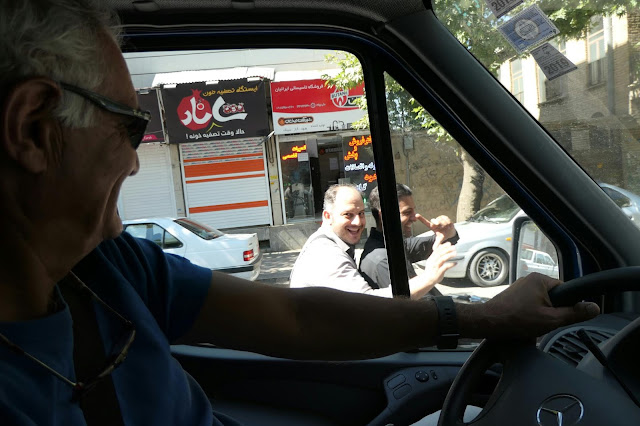08 September 2019
Lake Sarab - Anahita Temple Kangavar - Bisotun - Bisotun mountains
Orux map screenshot:
BLUE line is the planned route
RED line is the actual route we drove
Sarab is a pretty town, nicely decorated for the Muharram celebration with friendly people
BLUE line is the planned route
RED line is the actual route we drove
Sarab is a pretty town, nicely decorated for the Muharram celebration with friendly people
He takes a selfi with our car
While Hosain goes to the butchery to buy some meet, the vegetable vendor gives me some cucumbers as a present
In Kangavar, on an elevated rocky platform, is the remnants of a majestic structure. The same belongs to the pre-Islamic era and was known as Anahita. The name of this temple is depicted from Anahita (Nahid) who was a deity and gaurd angel of water, abundance and blessing. Some believe that the structure dates back to the Parthian era, whilst upon this relic the evidences of this period and the early Islamic era can also be noted. According to scientific researches, the architectural characteristics of this temple have acquired inspiration from that of the Achaemenian age. The main structure of the Anahita temple is a quadrilateral one. The difference between the lowest and highest point of the structure is 30 m and is in a form of steps, similar to the Achaemenian structures. At the foot of the eastern wall of the structure is a cemetery which is related to the Parthian era. It is noted that the deceased have been buried in such a way to face the Anahita structure.
View down into the city...
... whenever you visit Kangovar, this is the best Barber shop...
We meet these three young ladies from China at the gate to the temple. They study at the university in Tehran, Iranian culture, Filmmaker, Philosophie and speak very good farsi. We have a interedting chat about Anahita Temple and travelling through Iran.
From Kangovar to Bisotun
Bisotun with a Carvansaray beneath the mountain
Many vendors with different important goods on the way to the archelogical site
Bisotun is located along the ancient trade route linking the Iranian high plateau with Mesopotamia and features remains from the prehistoric times to the Median, Achaemenid, Sassanian, and Ilkhanid periods. The principal monument of this archaeological site is the bas-relief and cuneiform inscription ordered by Darius I, The Great, when he rose to the throne of the Persian Empire, 521 BC.
Below and around the bas-reliefs, there are ca. 1,200 lines of inscriptions telling the story of the battles Darius waged in 521-520 BC against the governors who attempted to take apart the Empire founded by Cyrus. The inscription is written in three languages. The oldest is an Elamite text referring to legends describing the king and the rebellions. This is followed by a Babylonian version of similar legends. The last phase of the inscription is particularly important, as it is here that Darius introduced for the first time the Old Persian version of his res gestae (things done).
We can only take a look at the inscription from far down, so at least with the camera zoom we know how it looks like
There are also remains from the Median period (8th to 7th centuries B.C.) as well as from the Achaemenid (6th to 4th centuries B.C.) and post-Achaemenid periods.
Hercules
Just few kilometres away in the Bisotun mountains we find a marvellous Camp site through the iOverlander app. This family just had a picknick in this area and rushes to us to say hello and take pictureswith Tara
Our friends Zari and Hamid arrive 2 hours later from Tehran and will accompany us for the next 5 days
Zari and Hamid have a sleepless first night with us, wild camping. First they hear wolves hauling and then 3 men with torches pass by. Tara, Me and Hosain have a deep sleep and don't hear anything, because BlueBird's doors are closed.
The next day a shepherd explains, that they lost some sheep and goats in the mountains, that's why the three men where around in the night to search for them. And, yes there are many wolves and many bears in the region. So we agreed with our friends that we keep our car door open, so that Tara can be aware of any wild animals and alarms us, since they sleep in a tent.
A big cave just beside our camp site
View from the cave down to our camp site and valley










































No comments:
Post a Comment